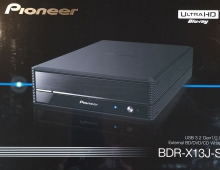
Warner Bros: Economy Drove Us to Blu-ray
Warner Bros's president Kevin Tsujihara said that
fears of a deteriorating U.S. economy and falling DVD industry sales helped drive the company's decision to back Blu-ray exclusively.
"We've typically been recession proof," Warner Bros Entertainment Group President Kevin Tsujihara said in an interview at the annual Consumer Electronics Show in Las Vegas, Reuters reports.
"But the thing that we saw in the fourth quarter...was gas prices beginning to affect sales. And since we're considered an impulse purchase, it's beginning to impact us," he said.
Tsujihara said the company needed to quickly erase consumer and retailer confusion over dueling DVD formats before economic conditions deteriorated.
Warner executives also said the consortium of companies backing Blu-ray, including five of the seven big Hollywood Studios, could spend more than $50 million in 2008 to convince consumers to upgrade, or more than the amount spent by the backers of both HD DVD and Blu-ray in the 2007 holiday season.
A 2007 decline in DVD sales, which account for half of Hollywood's profits, and anticipated further declines in 2008 sped Warner's decision making process.
Warner also said that worsening economical conditions in 2008 could scupper sales of new players, and movies, even if only one format survived.
"We've hit the first 30 million" households with high definition televisions, Tsujihara said. "As we go in deeper, they'll be more cost conscious."
At CES, Warner Home Video's president Ron Sanders was also asked whether Sony had paid Warner to exclusively support the Blu-ray.
Sanders chuckled and said, "I wish."
"Any payment would just be a drop compared to getting it wrong in the consumer marketplace," Sanders said.
Sander's also told BetaNews web site that Warner had fulfilled any contractual obligations to Toshiba, answering to a question regarding a possible legal reaction of Toshiba against Warner's decision. "That's why we will continue to provide movies in the HD DVD format through May rather than stopping now," he said.
"But the thing that we saw in the fourth quarter...was gas prices beginning to affect sales. And since we're considered an impulse purchase, it's beginning to impact us," he said.
Tsujihara said the company needed to quickly erase consumer and retailer confusion over dueling DVD formats before economic conditions deteriorated.
Warner executives also said the consortium of companies backing Blu-ray, including five of the seven big Hollywood Studios, could spend more than $50 million in 2008 to convince consumers to upgrade, or more than the amount spent by the backers of both HD DVD and Blu-ray in the 2007 holiday season.
A 2007 decline in DVD sales, which account for half of Hollywood's profits, and anticipated further declines in 2008 sped Warner's decision making process.
Warner also said that worsening economical conditions in 2008 could scupper sales of new players, and movies, even if only one format survived.
"We've hit the first 30 million" households with high definition televisions, Tsujihara said. "As we go in deeper, they'll be more cost conscious."
At CES, Warner Home Video's president Ron Sanders was also asked whether Sony had paid Warner to exclusively support the Blu-ray.
Sanders chuckled and said, "I wish."
"Any payment would just be a drop compared to getting it wrong in the consumer marketplace," Sanders said.
Sander's also told BetaNews web site that Warner had fulfilled any contractual obligations to Toshiba, answering to a question regarding a possible legal reaction of Toshiba against Warner's decision. "That's why we will continue to provide movies in the HD DVD format through May rather than stopping now," he said.





















